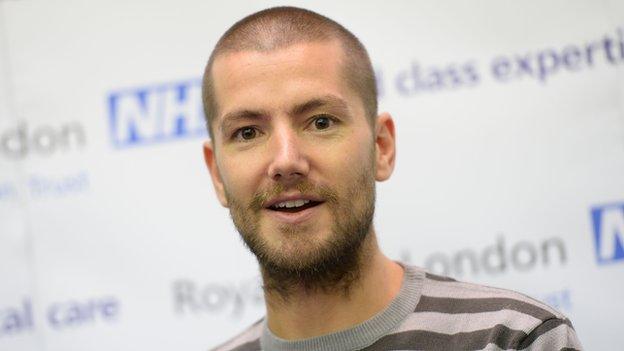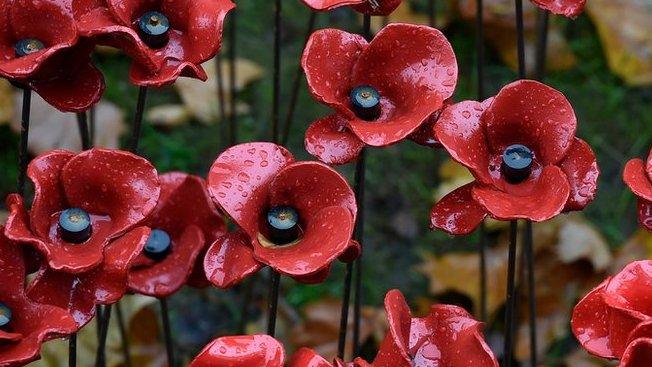Queen's Christmas message emphasises reconciliation
- Published

The Queen has used her Christmas Day broadcast to highlight the importance of reconciliation between people.
She spoke of the impact of the Scottish independence referendum, and also paid tribute to the moment German and British soldiers put down their weapons and met on Christmas Day 1914.
"Sometimes it seems reconciliation stands little chance... but the Christmas truce reminds us peace and goodwill have lasting power," she said.
The royals earlier attended church.

The Queen attended the traditional Christmas Day service at Sandringham

The Duke of Edinburgh led other members of the family on foot

While most members of the Royal Family were present, the Duchess of Cornwall and Prince George did not attend

In her address, the head of state said Christ's example taught her to "respect and value all people of whatever faith or none".
She said many felt "great disappointment" and others "great relief" after the Scottish vote which rejected independence, and "bridging these differences will take time".
In contrast, the Queen said she was reminded that Northern Ireland had already begun the journey to heal divisions when she visited a Belfast prison turned visitor attraction centre in June.

She began her broadcast by talking about a sculpture of a man and woman embracing by Josefina de Vasconcellos and called Reconciliation.
"While my tour of the set of Game Of Thrones may have gained most attention, my visit to the Crumlin Road Gaol will remain vividly in my mind," she said.
"What was once a prison during the Troubles is now a place of hope and fresh purpose; a reminder of what is possible when people reach out to one another, rather like the couple in the sculpture."
As the Queen spoke, footage of the visit was shown including the monarch walking through the famous building with Stormont First Minister Peter Robinson and Deputy First Minister Martin McGuinness - both of whom spent time in its cells in the 1970s or 1980s.

Analysis

By BBC Royal Correspondent Nicholas Witchell
The choice of reconciliation as the principal theme of the Queen's Christmas broadcast this year is hardly a surprise, given the attention that has been paid throughout 2014 to the centenary of the start of World War One.
More surprising perhaps was the extension of the theme to current-day situations such as Northern Ireland and Scotland.
The Queen recalled her visit to Belfast in June, and in particular to the former Crumlin Road prison (pictured). The monarch observed that what she had seen was "a reminder of what's possible when people reach out to one another".
Reconciliation was something which, by implication, the Queen suggested was also necessary in Scotland in the aftermath of the referendum. Many had felt great disappointment at the rejection of independence, while others had felt great relief, she said.
Finally the broadcast offered an insight into the central significance to the Queen of her Christian faith. It was, she said, an "inspiration and an anchor" to her life which had taught her to respect all people, of whatever faith or none.

Earlier, well-wishers caught a glimpse of the Queen and her family as they made their way to the traditional Christmas Day service at St Mary Magdalene Church - although neither the Duchess of Cornwall nor Prince George was there.
A Clarence House spokeswoman said the duchess had injured her back earlier this month and her doctors had advised against any travel.
The Duchess of Cambridge was given some chocolates for the prince by eight-year-old Maddison Neal, telling the youngster: "I'm sorry we didn't bring George but you would have heard him in the church."

At Sandringham

By Adele Tobe, BBC News
The Queen arrived by car at St Mary Magdalene Church just before 11:00 GMT. The Duke of Edinburgh led other members of the family on foot, including the Prince of Wales, the Duke and Duchess of Cambridge, Prince Harry and the Princess Royal.
The Duchess of Cornwall was notable by her absence due to a bad back. She has been advised by her doctors not to travel and is resting at home.
Sadly, for the crowds who had gathered from 05:00 expecting to see Prince George there was disappointment, as he stayed out of the public eye today.

The Queen recorded her Christmas message next to an embossed brass box of the type which would have contained Christmas gifts for troops serving in World War One in 1914.
The boxes were organised by the Sailors and Soldiers Christmas Fund created by Princess Mary, the daughter of King George V.
In the message, the Queen said of the first Christmas of the war: "Without any instruction or command, the shooting stopped and German and British soldiers met in No Man's Land. Photographs were taken and gifts exchanged. It was a Christmas truce...
"Sometimes it seems that reconciliation stands little chance in the face of war and discord. But, as the Christmas truce a century ago reminds us, peace and goodwill have lasting power in the hearts of men and women."

The Queen officially opened the Commonwealth Games in Glasgow in July
She described sport as a "wonderful way of bringing together people and nations" and this year's Commonwealth Games, staged in Glasgow during the summer, was highlighted as an example.
Images of injured servicemen and women and veterans who took part in the Invictus Games, organised by Prince Harry, were shown competing.
The Queen also reflected on the ceramic poppy tribute to World War One casualties and those who are helping to tackle the deadly Ebola outbreak in West Africa.
The hugely popular poppy installation at the Tower of London was "a reminder of the grief of loved ones left behind", she said.

Blood Swept Lands And Seas Of Red was hugely popular with the public
The monarch also revealed how she had been "deeply touched" by those who treated victims of Ebola.
The Queen described how the life of Jesus Christ was an "inspiration and an anchor in my life".
"Christ's example has taught me to seek to respect and value all people, of whatever faith or none," she said.
As the Royal Marines band played to signal the end of the address, the Queen said: "On that chilly Christmas Eve in 1914 many of the German forces sang Silent Night, its haunting melody inching across the line.
"That carol is still much-loved today, a legacy of the Christmas truce, and a reminder to us all that even in the unlikeliest of places hope can still be found.
"A very happy Christmas to you all."
- Published25 December 2014

- Published23 December 2014

- Published25 December 2014

- Published16 October 2014

- Published7 November 2014

- Published16 December 2014
